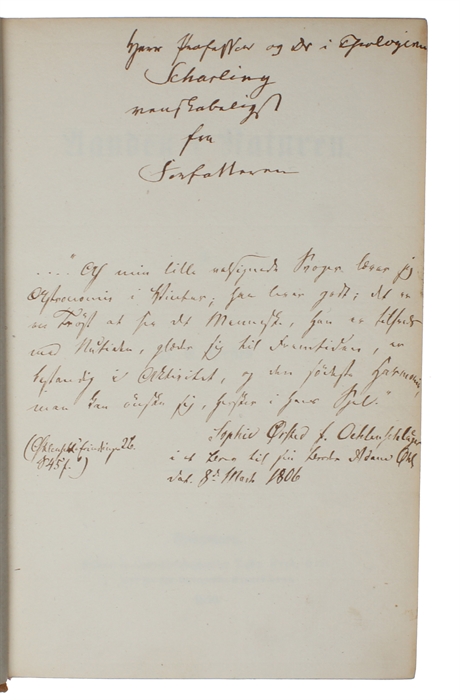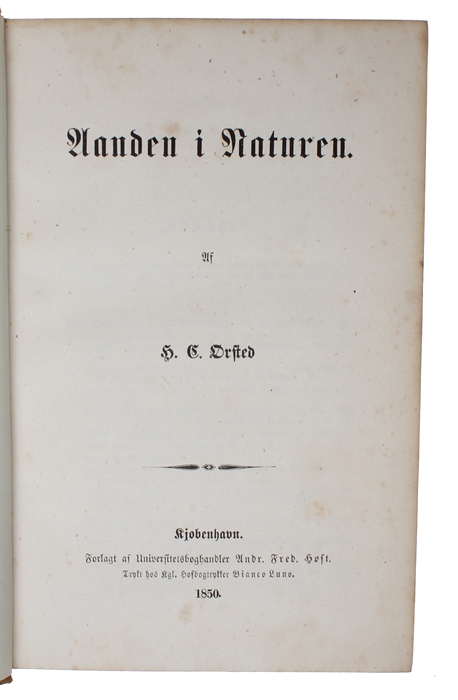PRESENTATION COPY OF HIS MAIN WORK IN NATURAL PHILOSOPHY
ØRSTED, H.C - OERSTED
Aanden i Naturen. 2 bd. (The Spirit in Nature. 2 Volumes).
Kjøbenhavn (Copenhagen), Andr. Fred. Høst, 1850.
8vo. Et nydeligt samt. hldrbd. m. samt. tidstypisk rig rygforgyldn. En smule slitage v. false og kapitæler, en anelse svag i forreste indre fals, ellers et nydeligt ekspl., kun indimellem brunplettet. X, 190; XII, 206, (2, -avertissement) pp.
8vo. Nice cont. hcalf w. richly gilt back. A bit of waer to hinges and capitals, and inner front hinge a bit weak, otherwise a very nice and good copy w. only occational brownspotting. X, 190; XII, 206, (2, -advertisement-leaf) pp.
Originaludgaven af Ørsteds naturfilosofiske hovedværk med dedikation fra forfatteren til "Herr Professor og Dr i Theologien/ Scharling/ venskabeligst/ fra/ Forfatteren." Under dedikationen er tilføjet et håndskrevet citat fra et brev af Sophie Ørsted (f. Oehlensläger) (fra Adam Oehlenschlägers Erindringer) i samtidig hånd (sandsynligvis Scahrlings).
Dedikationen er til professor Carl Emil Scharling (1803-77), teolog, som var bror til Ørsteds datters (Karen) mand.
First edition of Oersted's main work in natural philosophy. Presentation-copy with the inscription "Herr Professor og Dr i Theologien/ Scharling/ venskabeligst/ fra/ Forfatteren." (Mr. Professor and Doctor of Theology/ Scharling/ with the kindest regards/ The Author"). Underneath the presentation-inscription a handwritten quotation from a letter from Sophie Oersted (born Oehlenschläger) (from Adam Oehlenschläger's Memoires) in cont. hand (probably that of Scharling).
The presentation-inscription is for professor Carl Emil Scharling (1803-77), theologist, who was the brother of Oersted's daughter's (Karen) husband.
Oersted is universally known for his discovery of Electro-Magnetism in 1820. Afterwards he went on to write a number of important philosophical works on natural philosophy and empiricism, of which "Aanden i Naturen" he himself considered his main work.
The work is found printed on 2 sorts of paper, common- and vellum-paper. This copy is on vellum-paper. Both H.C. Andersen and Søren Kierkegaard admit to having been influenced by the writings of Oersted. "He was an enthusiastic follower of the "Naturphilosophie" school in Germany, whose main object was the unification of physical forces, thus producing a monistic theory of the universe. It was to further this purpose that Oersted sought in actual phenomena the electro-magnetic identity of which he had already convinced himself on metaphysical grounds" (Percy H. Muir in Printing and The Mind of Man).
Order-nr.: 34812



